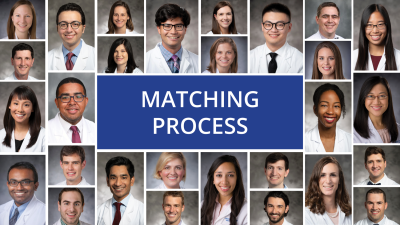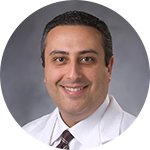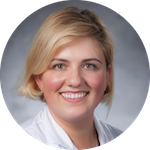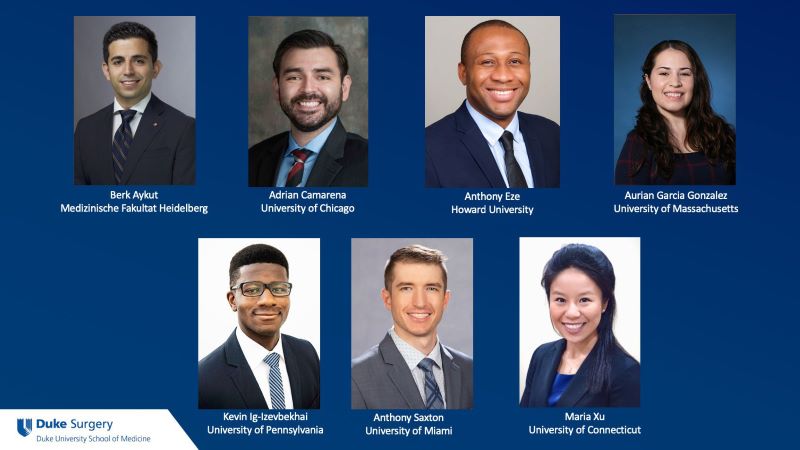
Reinventing the Matching Process for a Diverse Future
Image above: Collage features a sample of the current General Surgery residents
A certain group in this nation eagerly looks forward to March—medical students. To them, March is the start of a long, challenging, but rewarding journey. The ticket they need to begin will be revealed on Match Day.
Match Day is when a national system decides the path of these future doctors. In a time of awareness for the need for diversity within institutions to fully meet medical needs of patients from all walks of life, how can medical institutions use the same system to recruit a strong, diverse group of residents?
Breaking the Mold

Associate Professor ofSurgery, Division of Surgical Oncology
In Duke Surgery, faculty not only emphasize clinical practice for residency programs, but research as well. Research-oriented candidates and those focused on scientific discovery are highly sought after. Those with a record of achievement in research, however, usually come from privileged backgrounds or medical schools that had the resources for students to have a productive and fulfilling research experience. This creates a mold consisting of a very competent, but homogenous, group of individuals being recruited for residency.
John Migaly, MD, General Surgery Residency Program Director, and Ranjan Sudan, MD, Vice Chair of Education, noticed this pool of candidates lacks in diversity of thought or background. Change was needed so that the process for this year’s Match Day more accurately represents the views and values of the faculty and the Section of Surgical Disciplines at large.

Professor of Surgery,
Division of Metabolic
and Weight Loss Surgery
“We’re not going to necessarily look at a particular mold of individuals who we want to box the candidates into,” says Dr. Migaly. “We will have a much wider lens to view our candidates, so that we look at the diversity of the type of college they were coming from, diversity of interests, achievements, and how much distance they traveled from their backgrounds to get to where they were. These are factors that were more specifically considered in this selection process, as opposed to before.”
Faculty members in charge of recruitment understood that bringing in applicants with broader, more diverse backgrounds would help Duke grow as an institution. It would also help medical professionals at Duke to better interact with patients from various communities. This was the first step of a long process to create a significant and sustainable culture change within the Duke Surgery residency programs.
Diversifying the Selection Pool
Mariya Samoylova, MD, PGY-4 General Surgery Resident, was asked to help achieve the goal of increasing diversity while bringing a resident perspective to the selection process. As the newly appointed Resident Chair of Duke Surgery’s Diversity and Inclusion Committee, Dr. Samoylova took on a leadership role as a resident representative during the revision of the process.
“The intent here is to evoke change in culture on multiple fronts,” says Dr. Samoylova. “One of those fronts is to support greater cognitive diversity that will contribute to a greater creativity and achievement at the residency program and among the faculty.”

PGY-4 General Surgery Resident
To create a welcoming environment to diverse populations, the recruitment committee changed their approach in reaching out to applicants and based them all online. The changes include hosting online town halls addressing diversity and creating a General Surgery Residency Twitter account to interact with various societies, underrepresented groups, and individual applicants. They’ve also created an applicant buddy system where a General Surgery Resident is assigned to at least two applicants with whom to maintain phone or Zoom relationship outside of interviews.
Along with changes in recruitment, changes were also being made in how to approach the application screening. Faculty members in charge were much more involved than in previous years.
As a result, 42% of this year’s applicants interviewed were either from the Black, Hispanic, and/or Indigenous community and from historically Black colleges, universities, and medical schools—the highest percentage of underrepresented groups that the General Surgery Residency Program has ever interviewed.
“We had about 20 faculty members screening the applications and a subset of faculty members rescreening applicants from underrepresented groups,” says Dr. Migaly. “The applicants chosen were more closely a reflection of a broader swath of our faculty and more closely matched the ideals of the Department of Surgery.”
Awaiting Matching Results
“The matching process is really a computerized algorithm where the candidates get invited to an interview, based on whatever set criteria a program may have,” says Dr. Sudan. “For example, with the General Surgery Resident Program, we’ll get maybe 1,500 applicants and because they’re all very qualified, we use our criteria to help narrow down the list and invite around 90–100 of them for interviews. From there we narrow it down even further to select seven people to come to our institution.”
This process is repeated in medical institutions across the country. Candidates create a rank order list of preferred institutions. Similarly, each institution will also create a rank order list of the applicants they want to join them. These lists are submitted to an online system that matches applicants and institutions, and the results are released on a uniform date in March.

For Drs. Migaly, Samoylova, and Sudan, Match Day showed the effects of their new strategies for recruitment, and the matching and application processes. Increasing diversity in the General Surgery Residency is just the first step to make lasting changes within the Department of Surgery.
“The competition for really good, diverse, highly qualified, and competent candidates is actually pretty intense because you know they’re very much desired by all institutions,” says Dr. Sudan. “Education is the most easily modifiable element in a giant university like Duke. These changes have a ripple effect that can bring progress to our department and the university at large.”